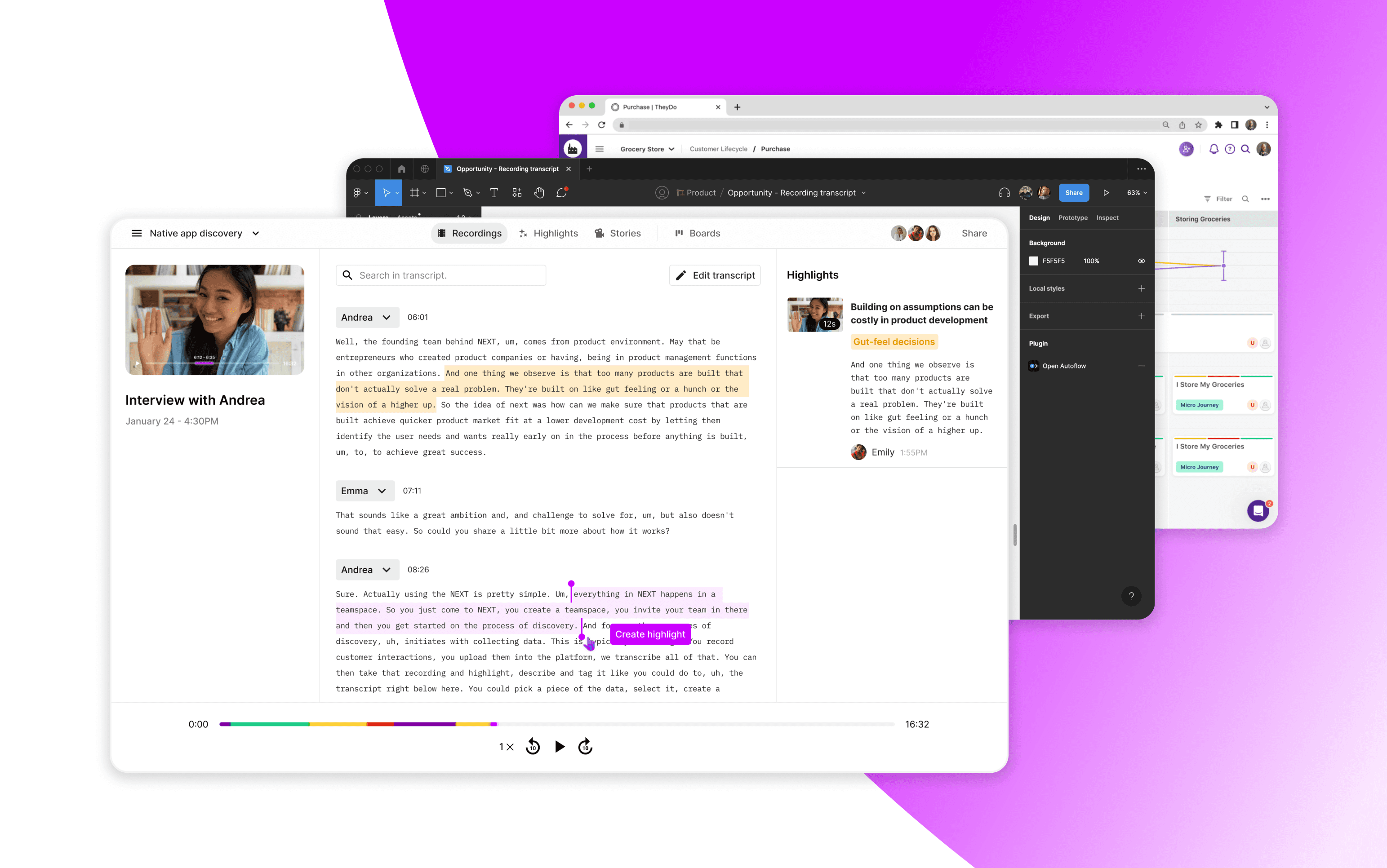Mar 30, 2023
Rick van der Werf
5 UX research tools for product teams in 2023
Today, we’re diving into our top 5 SaaS tools that we absolutely love for Product Discovery and UX Research in 2023. Say goodbye to tedious, time-consuming textbook UX methods and hello to tools that'll help you do research the way your team builds products! Join us as we explore how these tools elevate our product discovery game and help us build products our customers rave about.
The best product discovery tools in 2023

1. NEXT

At NEXT, we believe in making decisions rooted in real customer evidence. That's why we created our own platform to empower UX researchers and product teams to effortlessly collect, analyze, and share customer insights. NEXT is an AI-driven product discovery platform that provides fully automatic audio and video transcription and analysis reducing time/effort for research-to-impact by as much as 85%. In just seconds, it transforms recordings from user interviews or usability tests into actionable, video-based customer insights that can be shared with your team or stakeholders, or embedded into tickets in your backlog.
Key features:
AI-powered everything
Automatic transcription, clipping, highlighting, tagging, and summary of key customer moments
Video stories summarizing multiple interviews
Seamless integrations with tools you love, such as Jira, Miro, Figma and more!
With generative AI, NEXT offers automatic audio- and video transcription, highlighting & tagging, summarizing of interviews and video story creation. It has completely transformed the way we bring the customer into every product decision.
2. Figma

Figma is our go-to tool for design and prototyping. It enables our product designers and development team to create and iterate on designs easily and in a collaborative way. The powerful editing tools and extensive component libraries make Figma a must-have for product teams that develop digital products.
Key features:
Collaborative design environment
Powerful editing tools
Extensive component libraries
Figma's real-time collaboration keeps our product teams in sync, producing better prototypes and user experiences. We couldn't imagine designing without it!
3. Maze

Maze is a great solution for in-app user testing and in-depth prototype testing. It lets you test rapidly and gather actionable insights to improve your product or prototypes based on user feedback and behavior.
Key features:
Rapid testing of prototypes
Actionable analytics and reports
User recruitment
Maze is a go-to tool for quickly validating prototypes and designs based on immediate user feedback. It lets you make data-driven improvements to your wireframes or prototypes.
4. TheyDo

TheyDo stands out as our top choice for user journey mapping and journey management. This tool helps product teams visualize and optimize customer experiences, revealing the hidden connections between people, processes, and products. This empowers you to pinpoint opportunities for user experience improvements throughout every stage of the customer journey.
Key features:
Intuitive user journey mapping interface
Seamlessly connects people, processes, and products for UX improvements
Collaborative workspace for team synergy
TheyDo transforms the user journey mapping process, providing users with valuable insights into our customers' needs and pain points. The integration of journey management has proven indispensable in crafting better experiences across the entire user journey. With TheyDo, we can confidently navigate the complexities of customer experience, ensuring every touchpoint delights our end user.
5. Miro

Miro offers an infinite canvas for creative collaboration, enabling UX researchers and product teams to brainstorm, plan, and refine ideas or concepts together, regardless of their location.
Key features:
Infinite canvas
Real-time collaboration
Extensive template library
Miro's flexible platform empowers your team to work together seamlessly, breaking down geographical barriers and ensuring a unified vision for your product. Unleash your team's creative genius and watch your product flourish!
The Future of product discovery and UX research is AI
As AI technology evolves, we're on the brink of an exciting transformation in product discovery and UX research. We're entering an era of "AI-assisted" research, and NEXT is leading the way by aiming to fully automate the product discovery process, from customer interaction to customer insight.
NEXT's mission is to enable teams to delve deeper into understanding their users' needs and wants, without losing the human touch that makes UX research invaluable. With AI assistance, product teams can focus on what technology can't replace: empathetic decision-making rooted in a true understanding of customers or end-users. This shift lets teams engage with more users, uncovering insights that might have otherwise gone unnoticed.
By leveraging AI, UX researchers and product teams can focus on what they do best: innovating and creating amazing products that solve real user needs and pains.
Choosing the best tool for your team
There's no one-size-fits-all product discovery tool and you'll likely need a combination of tools. Keep these questions in mind when evaluating your options:
Will this tool 10x our productivity?
How user-friendly is it, and how quickly can our team become proficient with it?
How will this tool facilitate collaboration within our team and with external stakeholders?
How seamlessly does it integrate with our existing UX/UI design tools and workflow?
We've just revealed our favorite product discovery and UX research tools for 2023, showcasing their standout features and the immense value they provide to teams like ours. Now it's your turn to dive in! As Teresa Torres emphasizes in her book, "Continuous Discovery Habits," product discovery is a never-ending journey. With these powerful tools at your disposal, you'll be well-equipped to make your product discovery process more fluid and effective, anchoring your product decisions in real customer insights.
Ready to supercharge your product discovery work? Sign up for NEXT and start harnessing the power of AI to bring the customer into every product decision.




